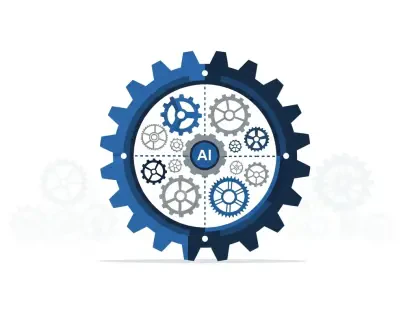The increasing use of artificial intelligence (AI) among mid-sized industrial manufacturers is revolutionizing the industry. These companies are finding that the best AI solutions are often embedded in their primary digital platforms, such as enterprise resource planning (ERP) systems, especially when these systems are cloud-based software-as-a-service (SaaS) offerings. David Koenig from SAP emphasizes that for manufacturers to leverage AI optimally, these capabilities need to be as close as possible to their data and processes. This proximity ensures the highest quality insights and the most accurate actions. An ERP system, a central hub for business operations, offers this proximity, making the AI capabilities within it highly accessible, easy to scale, and cost-effective for mid-sized manufacturers.
The Prevalence of ERP Systems in Manufacturing
Widespread Adoption of ERP Systems
A survey by Oxford Economics involving 2,100 small and mid-sized businesses reveals that 70% of industrial manufacturers already use ERP systems. This prevalence indicates that these systems touch various business aspects, providing a straightforward path to scale AI across the organization. Cloud-based SaaS ERP systems further enhance this by offering rapid implementation of new AI features and functionalities. Manufacturers are increasingly recognizing the need to integrate AI into their daily operations to remain competitive in a rapidly evolving market. Whether optimizing supply chain logistics or enhancing customer engagement, AI within ERP systems can play a crucial role in driving efficiency and innovation.
The widespread adoption of ERP systems among mid-sized manufacturers underscores the foundational role these platforms play in modern industrial operations. By centralizing data and processes, ERP systems make it easier for companies to implement advanced technologies like AI without the need for substantial overhauls. As ERP systems evolve, their built-in AI functionalities are becoming more sophisticated, offering manufacturers new ways to leverage data for enhanced decision-making and operational performance. This seamless integration of AI into existing ERP systems presents a compelling case for mid-sized manufacturers to embrace these technologies actively.
Current Utilization and Future Plans
Despite the widespread use of ERP systems, a significant portion of mid-sized manufacturers are not yet utilizing AI, with only about 18% currently using it. However, many plan to adopt it within the next year, driven by the potential benefits and competitive pressures in the industry. The continuous innovation pipeline is poised to meet this growing interest, offering new uses for AI regularly. As manufacturers become more familiar with the capabilities of AI, the adoption rate is expected to rise, transforming how these companies operate and compete. AI’s ability to analyze large volumes of data and generate actionable insights makes it a valuable asset for mid-sized manufacturers looking to improve efficiency and reduce costs.
The future of AI in mid-sized manufacturing appears bright, with companies increasingly recognizing its potential to drive significant value. As new AI applications and functionalities become available, the barriers to adoption are expected to decrease, making it easier for manufacturers to integrate these technologies into their existing systems. This trend is likely to result in more widespread use of AI, enabling mid-sized manufacturers to stay competitive in a rapidly evolving market. The focus will be on implementing AI solutions that provide tangible benefits, such as improved productivity, reduced downtime, and enhanced customer satisfaction.
Promising AI Use Cases for Mid-Sized Manufacturers
Finish Incomplete Sales Orders
One of the most promising AI use cases for mid-sized manufacturers is the ability to finish incomplete sales orders efficiently. AI can recommend missing part numbers or correct misspelled information in sales orders, allowing agents to promptly update and fulfill orders. This capability streamlines the sales process, reducing errors and improving efficiency. By automating these tasks, AI can save valuable time for sales representatives, enabling them to focus on more strategic activities. This not only improves order accuracy but also enhances customer satisfaction by ensuring that orders are processed quickly and accurately.
The impact of AI on sales order processing extends beyond just correcting errors. AI can also analyze historical sales data to predict future demand, helping manufacturers manage inventory more effectively. By identifying trends and patterns in sales data, AI can provide insights into which products are likely to be in high demand, allowing companies to adjust their production schedules accordingly. This proactive approach can help mid-sized manufacturers avoid stockouts and overproduction, leading to more efficient operations and better customer service. Ultimately, the integration of AI into sales order processing can drive significant improvements in efficiency and accuracy.
Order Fulfillment Issues
Order fulfillment is another critical area where AI can make a significant impact. A generative AI copilot in a cloud ERP system can quickly identify delayed orders, determine causes such as supply chain issues, and suggest remedies like alternative suppliers. This enables managers to update production plans and inform customers about revised delivery dates, enhancing customer satisfaction and operational efficiency. By providing real-time insights and recommendations, AI can help manufacturers navigate the complexities of supply chain management, ensuring that orders are fulfilled promptly and accurately. This proactive approach to order fulfillment can streamline operations, reduce lead times, and improve overall customer satisfaction.
In addition to addressing order delays, AI can also optimize the entire order fulfillment process. By analyzing data from multiple sources, AI can identify bottlenecks and inefficiencies in the supply chain, allowing manufacturers to take corrective actions. For example, AI can recommend adjustments to production schedules or inventory levels based on real-time demand and supply conditions. This level of optimization can help mid-sized manufacturers achieve higher levels of efficiency, reduce costs, and improve customer satisfaction. The ability to quickly respond to changes in the supply chain can provide manufacturers with a competitive edge in the market, enabling them to deliver products more reliably and efficiently.
Field Equipment Servicing
Field equipment servicing is another domain where AI can deliver substantial benefits to mid-sized manufacturers. AI can analyze equipment visuals and operating data to provide maintenance or repair suggestions, assisting both inexperienced and seasoned service workers by offering real-time guidance and documentation. This capability not only improves service quality but also reduces downtime, ensuring that equipment is always in optimal working condition. By leveraging AI for predictive maintenance, manufacturers can proactively address potential issues before they lead to equipment failures, minimizing disruptions and maximizing productivity. This proactive approach to equipment servicing can significantly enhance the overall efficiency of manufacturing operations.
Moreover, AI-driven field equipment servicing can extend the lifespan of equipment by ensuring that maintenance is performed at the right time and in the right way. By analyzing operating data and identifying patterns that indicate wear and tear, AI can provide actionable recommendations for preventive maintenance. This helps manufacturers avoid costly repairs and replacements, ultimately reducing operational expenses. Additionally, AI can facilitate remote diagnostics and troubleshooting, allowing service technicians to address issues without having to be physically present on-site. This capability can be particularly valuable for mid-sized manufacturers with limited resources, enabling them to manage equipment maintenance more effectively and efficiently.
Sales Process Support
AI also holds the potential to revolutionize the sales process for mid-sized manufacturers by providing tailored product and configuration recommendations for customers. By analyzing historical sales data and ongoing digital conversations, AI can generate specific product suggestions, estimated prices, production lead times, and more. This capability not only enhances customer interactions but also improves sales efficiency by delivering timely and relevant information. Sales representatives can leverage AI-generated insights to better understand customer needs and preferences, enabling them to offer more personalized and compelling product recommendations. This tailored approach can significantly improve the overall customer experience, driving higher sales and customer satisfaction.
Furthermore, AI can streamline the sales process by automating routine tasks and providing valuable insights into customer behavior and market trends. For example, AI can identify cross-selling and upselling opportunities based on historical purchase patterns, helping sales representatives maximize revenue from each customer interaction. AI can also monitor competitor activity and market conditions, providing real-time insights that can inform sales strategies and pricing decisions. By equipping sales teams with these advanced AI tools, mid-sized manufacturers can enhance their competitive positioning and drive sustainable growth. The integration of AI into the sales process represents a significant advancement for mid-sized manufacturers, enabling them to operate more strategically and effectively.
The Broader Impact of AI in ERP Systems
Enhancing Various Business Facets
The growing list of AI use cases in industrial manufacturing covers various facets such as demand forecasting, inventory management, quality control, predictive maintenance, production optimization, and energy management. Many of these capabilities might already be available within a business’s existing ERP system, ready to offer new value. For instance, AI-driven demand forecasting can help manufacturers accurately predict future demand, enabling them to optimize production schedules and inventory levels. Similarly, AI-powered quality control can identify defects in real-time, ensuring that only the highest quality products reach customers. These capabilities can drive significant improvements in efficiency, quality, and overall business performance.
In addition, AI can enhance energy management by optimizing energy usage across manufacturing processes, reducing operational costs, and minimizing environmental impact. By continuously monitoring equipment and process data, AI can identify opportunities to reduce energy consumption and implement more sustainable practices. This is particularly important for mid-sized manufacturers looking to reduce their carbon footprint and comply with increasingly stringent environmental regulations. The ability to leverage AI for comprehensive business optimization can provide mid-sized manufacturers with a competitive advantage, enabling them to operate more efficiently and sustainably. The broader impact of AI in ERP systems extends to all aspects of manufacturing operations, driving continuous improvement and innovation.
Streamlining AI Adoption
David Koenig and Nico Dahl from SAP provide insights into how cloud-based ERP systems can streamline AI adoption for mid-sized manufacturers. This approach ensures these companies gain the benefits of AI without the need for separate, often disjointed point solutions. By integrating AI capabilities directly into ERP systems, manufacturers can avoid the complexity and expense of implementing standalone AI solutions. This not only addresses the need for efficiency but also prepares mid-sized manufacturers to compete more effectively against larger, better-funded competitors. The seamless integration of AI into ERP systems enables manufacturers to quickly deploy and scale AI across various business processes, driving rapid innovation and growth.
Moreover, cloud-based ERP systems offer a scalable and cost-effective platform for AI adoption, allowing mid-sized manufacturers to leverage advanced technologies without significant upfront investments. These systems provide access to the latest AI tools and capabilities, enabling manufacturers to continuously innovate and stay ahead of the competition. The ability to rapidly implement and scale AI solutions can drive significant improvements in productivity, quality, and customer satisfaction. By streamlining AI adoption, cloud-based ERP systems empower mid-sized manufacturers to harness the full potential of AI, transforming their operations and driving long-term success. The future of AI in mid-sized manufacturing is bright, with cloud-based ERP systems playing a central role in its realization.
The Future of AI in Mid-Sized Manufacturing
Integrated, Scalable, and Cost-Effective Solutions
The overall trend indicates that leveraging AI within ERP systems provides a more integrated, scalable, and cost-effective solution for mid-sized manufacturers. The streamlined introduction of AI via cloud-based ERP systems ensures rapid deployment and scaling across different business processes, aligning well with the operational leanness required by smaller firms to stay competitive. This approach eliminates the need for extensive customization and integration, allowing manufacturers to quickly realize the benefits of AI. By leveraging AI within ERP systems, mid-sized manufacturers can enhance their agility and responsiveness, enabling them to adapt to changing market conditions and customer demands more effectively.
Furthermore, integrated AI solutions can drive significant improvements in operational efficiency and decision-making. By providing real-time insights and recommendations, AI can help manufacturers optimize their production processes, reduce waste, and improve overall quality. This can lead to higher profitability and a stronger competitive position in the market. As AI technologies continue to evolve, their integration into ERP systems will likely become increasingly sophisticated, offering even more advanced capabilities. The future of AI in mid-sized manufacturing lies in the seamless integration of these technologies into existing systems, enabling manufacturers to operate more efficiently and innovate continuously.
Unlocking Significant Value
A survey by Oxford Economics involving 2,100 small and mid-sized businesses reveals that 70% of industrial manufacturers use ERP systems. This highlights how these systems impact various business aspects, paving the way to scale AI across organizations seamlessly. Cloud-based SaaS ERP systems boost this by enabling the quick addition of new AI features and functionalities. Manufacturers increasingly see the necessity of integrating AI into daily operations to stay competitive in a fast-changing market. Whether optimizing supply chain logistics or improving customer engagement, AI in ERP systems can significantly enhance efficiency and innovation.
The widespread use of ERP systems among mid-sized manufacturers underscores their fundamental role in contemporary industrial operations. By centralizing data and processes, ERP systems facilitate the implementation of advanced technologies like AI without requiring major overhauls. As ERP systems evolve, their AI capabilities become more advanced, offering manufacturers innovative ways to use data for better decision-making and operational excellence. The seamless integration of AI into existing ERP frameworks makes a compelling case for mid-sized manufacturers to adopt these advanced technologies actively.









